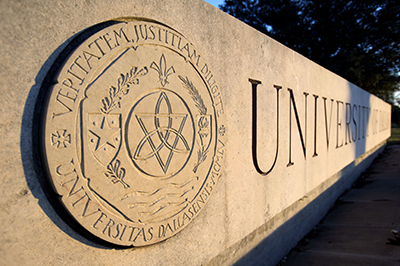 Menu
Menu

Last time, I wrote about Dr. Alvis’ two questions of a liberal education. I have tried this idea on some of my colleagues, and some of them responded that they do something similar in their classes, but with different questions — and different numbers of questions. I thought I might share them with you here. It suggests there might be various ways to sharpen one’s sense of a liberal education, and think through all of one’s classes on the way to this lifetime goal of becoming truly free.
Dr. Matthew Walz in the Philosophy Department says he constructs every class around the following five questions, taken from St. John Paul II’s Fides et Ratio:
Who am I?
Where do I come from?
Where am I going?
Why do evils exist here?
What awaits us after this life?
You may know that, in reading Plato’s Republic, our students encounter Plato’s famous Myth of the Cave. In this myth, there are people sitting chained in a room in a cave looking at the wall opposite them. Behind them is a fire and other people moving shapes that cast shadows on the wall. But one day someone breaks free of the chains, leaves the cave, and discovers that what he thought was reality was just shadows on a wall cast there by others; now he sees the sun, and sees, well, reality. It’s a grand metaphor for how most people live their lives not really seeing reality, but also how one can learn to be philosophical, to see real reality, not just shadows. So Dr. Lance Simmons, also in Philosophy, as he thinks about Plato’s Cave, says he has only two questions for his students:
What kind of cave do I live in?
How do I live so as to escape that cave?
Dr. Debra Romanick Baldwin, in English, uses the 18th-century philosopher Immanuel Kant to help her formulate her questions:
What can we know?
How shall we act?
What can we hope for?
And Dr. J. Lee Whittington in Business, who heads up the master’s-level program in Leadership, puts it this way:
Who am I?
Where am I going?
What obstacles threaten to derail me?
How can I match my personality and leadership style to my values to create the right strategies for success?
How do I discover and live into my unique, God-given design?
What kind of legacy will I leave behind me after I am gone?
I offer these here as alternatives to Dr. Alvis’ way of organizing a liberal education, but I think these are complementary, not opposed, to his. Each of these sets of questions also would make for a great final exam. They each ask a student to move from truth to action (so perfectly befitting UD’s motto: Veritatem, Justitiam Diligite: Study Truth and Justice). They each ask a student to move beyond the usual platitudes of mainstream culture, think deeply about our proper ends in life, and then live out those decisions. For that, of course, is the point of a UD education: to see reality clearly (truth), to act well (justice), and to be drawn to the beautiful.
The Core is not just about becoming sophisticated at cocktail party banter. It’s not about simply mastering texts. It’s not designed simply to help students gain skills for the job market (although, because of this deep and rich education, our students do very, very well out in the world). No, it’s about knowing who they are, what they are doing, and how they can attain a well-lived life of rich humanity, deep happiness, and ultimately, heavenly blessedness. The Great Books, and the Great Conversation they foster, are there not for their own sake but to get students to ask these questions of themselves, and for themselves, so they can reach this free, beautiful, and just life.